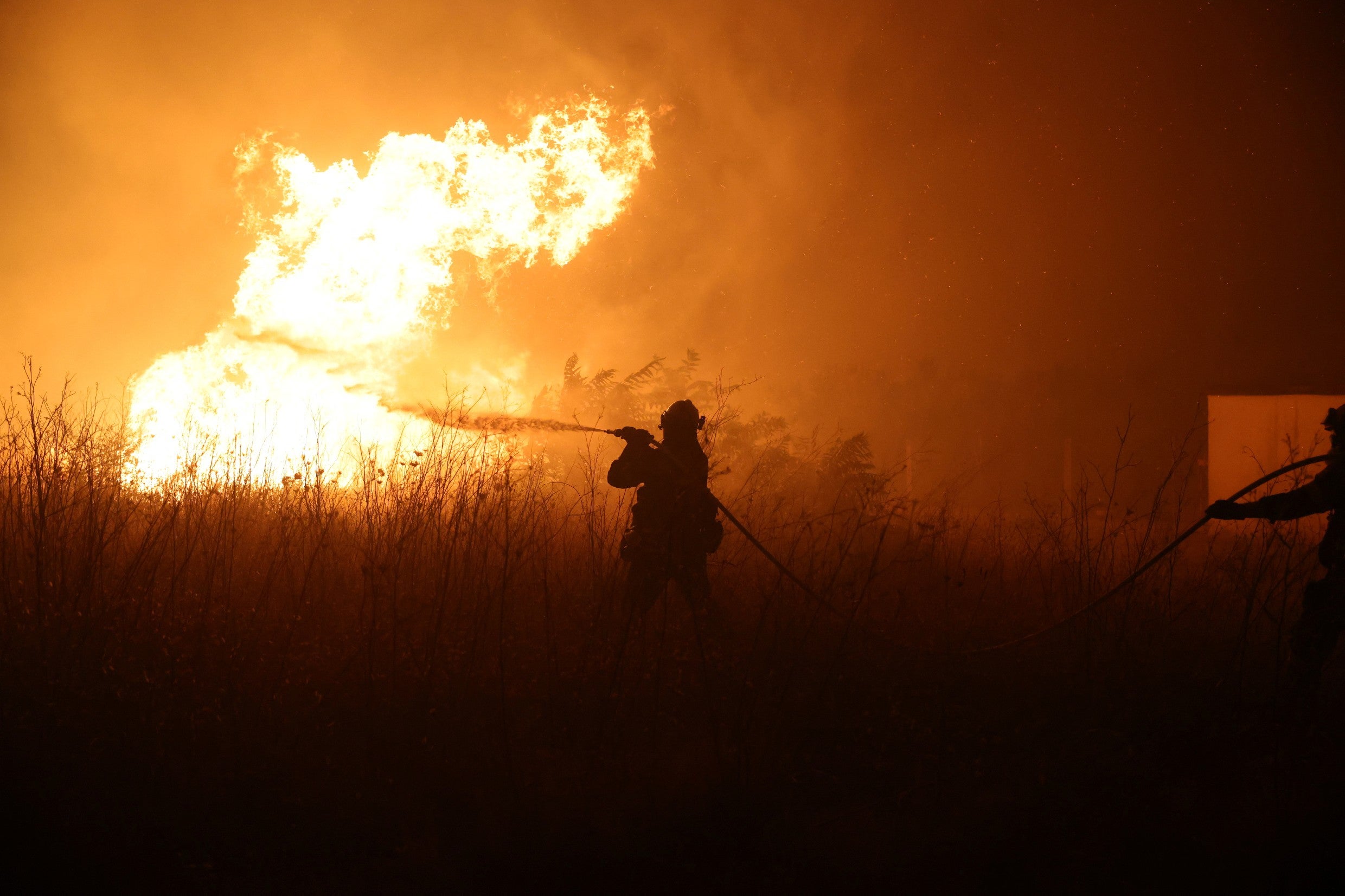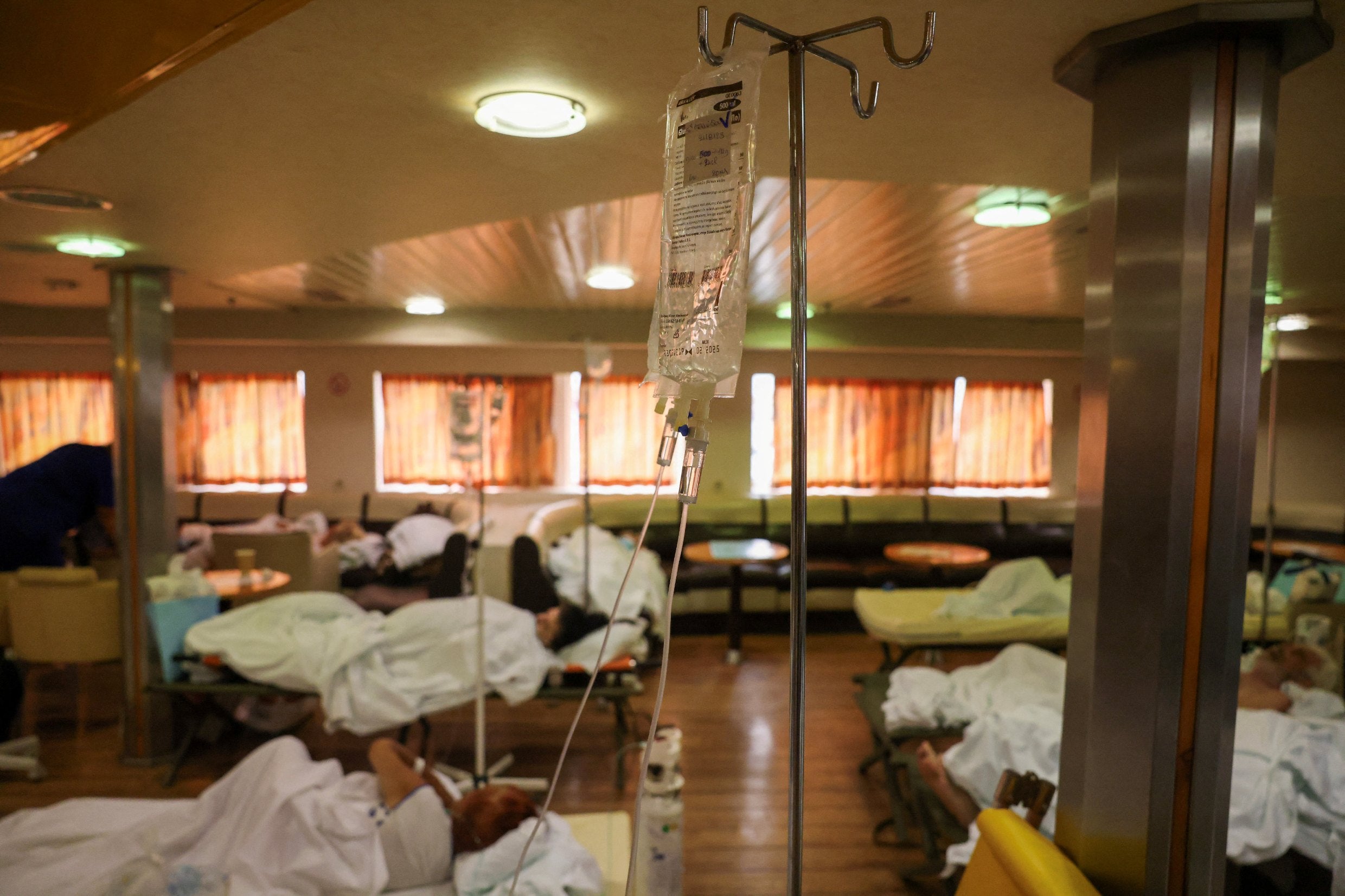Newborn babies among dozens of patients evacuated from hospital to ferry to escape raging Greek wildfire
It comes as 18 burned bodies are found in another area pf the same region

Dozens of hospital patients – including newborn babies – have been evacuated onto a ferry in the Greek port city of Alexandroupolis away from a wildfire that has raged for days.
It comes as a fresh heatwave hit southern Europe. Authorities urged residents to avoid the heat as France, Italy, Spain and elsewhere suffered hot, dry and windy conditions that scientists have linked to the climate crisis. Firefighters were also battling blazes in Spain and Italy.
In Alexandroupolis, northeastern Greece, a ferry was turned into a makeshift hospital after 65 patients were evacuated from the University Hospital in the early hours. Ambulances also ferried patients away from a nearby clinic.
Elderly patients lay on mattresses strewn across the cafeteria floor, paramedics attended to others on stretchers and a woman held a man resting on a sofa, an IV drip attached to his hand.
"I've been working for 27 years, I've never seen anything like this," said nurse Nikos Gioktsidis. "Stretchers everywhere, patients here, IV drips there... it was like a war, like a bomb had exploded."
Several communities in the broader Evros region, near the border with Turkey, have been evacuated as authorities warned the risk of new fires remained high in the next few days.
Greek firefighters have also found the bodies of 18 people in the Alexandroupolis region. Greek police activated the country's Disaster Victim Identification Team to identify the bodies, which were found near a shack in the Avanta area, Ioannis Artopios, a spokesman for the fire department, said in a televised statement.
Given no reports of missing people had been filed in the area, authorities were examining the possibility that the casualties were migrants who had entered the country from the nearby border with Turkey, Mr Artopios said. The broader Evros region is a popular route for migrants crossing the river by the same name from Turkey into Greece.
"Weather conditions are extreme and will remain extreme for the coming days," Fire Service spokesman Vassilis Varthakogiannis told the public broadcaster ERT TV.
In Spain, where most of the country was in very high or extreme risk of wildfire as a consequence of the summer's fourth heatwave, authorities were struggling to stabilise a huge wildfire that has been ravaging forests on the island of Tenerife for a week.

The blaze has burned through 15,000 hectares in 12 municipalities forcing the evacuation of thousands of people. In neighbouring Portugal, authorities placed more than 120 municipalities in the north and central areas, as well as in some parts of the Algarve - a popular holiday destination in the south - at maximum risk of wildfires due to the heat.
More than 100 firefighters backed by 10 aircraft were battling a wildfire that erupted on Monday night in the northern city of Baiao.
Temperatures are likely to reach or exceed 40 degrees Celsius (104 degrees Fahrenheit) in large areas of the southwest and northeast of the Iberian peninsula, national weather agency AEMET said.
In Italy, around 700 people have been evacuated after a fire broke out on Monday on the Tuscan island of Elba, in the woods between Rio Marina, firefighter Alessandro Vitaliano told Reuters. No casualties have been reported.
A total of 14 hectares have burned so far. Evacuees are expected to return to their homes in the evening, Italian news agency ANSA said, after the fire was contained. The cause of the fire was not known.
Italy issued hot weather red alerts in 16 of the country's 27 main cities on Tuesday, including Rome, Milan and Florence, with the number set to rise on Wednesday. A red alert denotes "emergency conditions", the health ministry said, advising people not to go out during the hottest part of the day.
In France, four southern regions - the Rhone, Drome, Ardeche and Haute-Loire - were placed under red alert, the country's most serious warning. This allows authorities to call off events and close public facilities if needed.
Climbers were asked to delay scaling Mont Blanc, Europe's highest peak, because high temperatures have created dangerous conditions.
Grape-pickers in wine-producing regions of southern France have been advised to start work on the harvest in the early hours of the morning to avoid sweltering in the late summer heatwave.
The high temperatures were affecting large parts of France and were expected to peak at 42C in the Rhone valley over the next 48 hours.
Reuters
Join our commenting forum
Join thought-provoking conversations, follow other Independent readers and see their replies
Comments
Bookmark popover
Removed from bookmarks